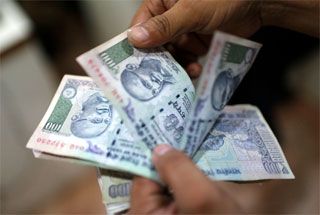This will encourage exports and discourage non-essential imports such as precious metals
 In the past year, oil prices have halved in US dollar terms. However, Russia, one of the world's largest oil exporters, continues to receive pretty much the same number of roubles per barrel it used to get a year ago. This is because there has been a big run on the Russian currency.
In the past year, oil prices have halved in US dollar terms. However, Russia, one of the world's largest oil exporters, continues to receive pretty much the same number of roubles per barrel it used to get a year ago. This is because there has been a big run on the Russian currency.
In effect, trading in rouble has stopped in the past few sessions. You will see quotes ranging from 68 to 73 roubles a dollar. The currency was trading at 32 a dollar in January. The Russian central bank has raised interest rates multiple times in the past 10 days, with the last hike going from 10 per cent to 17 per cent. This smells of desperation.
In theoretical terms, Russian government debt will now pay that enormous interest rate. In practice, there is a real danger that there will be a default on payments as in 1998. Alternatively, the currency fall might continue and wipe out potential gains in rouble-interest.
Domestic inflation in Russia was running at eight per cent last month, when the rouble traded at 45 to a dollar. Inflation is bound to zoom and imported items will double in price. Anecdotes suggest that Russian supermarkets are changing price tags on imported items a couple of times a day. High-end electronics manufacturers such as Apple have suspended sales in Russia until the currency stabilises.
This crisis has fair chances of infecting the global economy because Russia is a large energy exporter. India is particularly vulnerable because of strong Indo-Russian trade ties. If trade agreements between the two nations are priced in roubles, the terms will need drastic review.
There's another point to be noted. The rouble is now considerably weaker than the rupee apart from being much more unstable. This means that Russian exports are more competitive than India. Of course, India and Russia don't have too many areas of export competition. But it could alter the trade balance between the two countries.
Most of the world's traders have their fingers crossed as the US Federal Reserve meets this week and the Fed's meeting will also be followed by a policy meet of the Bank of Japan. If the Fed is not hawkish and seems unlikely to hike policy rates, global currency markets will stabilise quicker. If the Fed threatens to tighten, this could turn into a big bear market.
On a broader perspective, the dollar has gained against most world currencies in the past six months. It is up sharply versus the Yen and the Euro and also up versus the rupee. But in relative terms, the rupee has been stronger than most other currencies.
This adversely affects India's global export competitiveness. In effect, it encourages imports and discourages exports. Given a negative trade balance, and a negative current account, that might not be the healthiest situation.
Indeed, the November trade deficit (imports minus exports) hit $16.8 billion, an 18-month high.
Exports grew seven per cent, but imports jumped 27 per cent. Crude oil imports fell in value terms but non-oil imports hit new highs. Gold and silver imports shot through the roof. The price of oil — India's largest import item — is down and so is the price of natural gas and coal.
Ideally, the Reserve Bank of India (RBI) will want the rupee to weaken, so as to encourage exports and to discourage non-essential imports such as precious metals. One way to do this is to buy USD (thus selling rupees). Another way is to cut policy rates. The RBI has to walk a tightrope given what is happening this week.
Devangshu Datta is a technical and equity analyst




.jpg)






